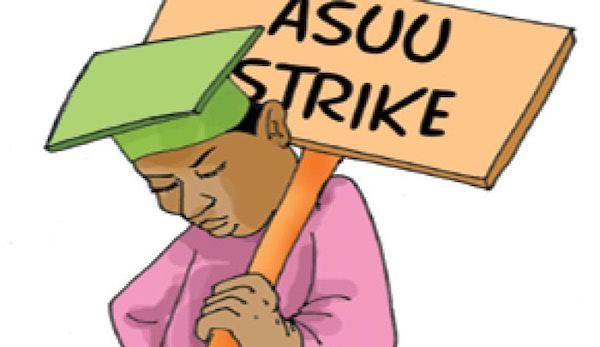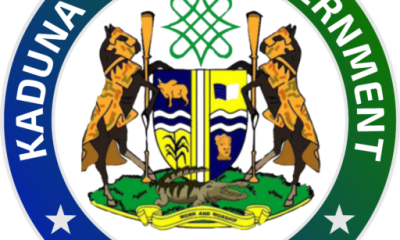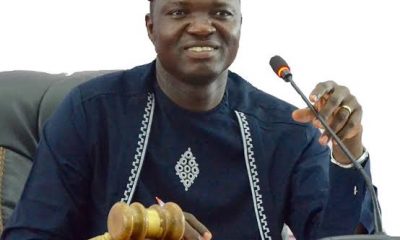Education
ASUU Strike: For Quick Resolution Refer Dispute to Chartered Institute of Arbitrators

By Aare Afe Babalola
Since the Academic Staff Union of Universities, ASUU, commenced its strike on February 14, 2022, there had been no headway in the resolution of its dispute with the Federal Government.
All reconciliation meetings held between the Federal Government and members of the Union had met brick walls.
With the end of its earlier warning strike ending on May 8, ASUU announced another “roll-over” 12-week strike action commencing on May 9, 2022.
The Union’s communique reads: “After extensive deliberations, noting Federal Government’s failure to live up to its responsibilities and speedily address the issues raised in the 2020 FG-ASUU Memorandum of Action, within the additional eight-week roll-over strike period declared on March 14, 2022, NEC resolved that the strike be rolled-over for 12 Weeks to give government more time to satisfactorily resolve all the outstanding issues.
Reactions: The National Association of Nigerian Students threatened to embark on a nationwide protest, to block all airport roads, disrupt political party primaries, and block the National Assembly until their voices are heard.
Several stakeholders, including the Aare Ona Kakanfo of Yorubaland, Iba Gani Adams, lent their voices in decrying the extension of the strike action and further called on the stakeholders to resolve it, citing the effect of any further strike on the students.
The Minister of Labour and Employment, reacting to the announcement of a further strike, noted that the action is being carried out in breach of the labour laws. In context, he reportedly stated as follows: “Ministry of Labour and Employment is not the direct employer of the university teachers.
The process is that whenever ASUU has a problem with the Federal Ministry of Education, which is their direct employer, the ministry will have to try and resolve it using its internal dispute resolution mechanisms.
So when there is a breakdown in negotiations, and I apprehend the dispute on my table, and the workers refuse to go back to their work while discussions are ongoing, it is a breach of the labour law. We had apprehended the ASUU strike, we did that on February 22, and we continued the conciliation on March 1.”
Why was ASUU established?
The Academic Staff Union of Universities, ASUU, was founded in 1978 primarily to demand the rights of academic staff in the country’s Federal and state universities. In carrying out this mandate, the Union has never shied away from embarking on warning and indefinite strike actions, as well as acting as a watchdog against corruption by its members who hold key positions in its member institutions.
Under the presidency of Dr. Oladipo Fashina, the Union petitioned the Independent Corrupt Practices Commission in July 2002 to investigate the University of Ilorin’s management for financial mismanagement and corruption.
In May 2008, the Union began a series of warning strikes to press a number of demands, including an improved salary scheme and the return of the pension system. In June 2009, the Union issued an indefinite strike order to its members at federal and state colleges across the country due to differences with the Federal Government over an agreement struck around two and a half years earlier.
The Union went on strike again on July 1, 2013, for five months and 15 days. The Union sought proper financing and the revitalisation of public universities, as well as the payment of their earned allowance, which was N92 billion in arrears. One thing is certain: the Union has always been outspoken in its opposition to what it sees as unfairness to its members, and it has been in the forefront of the fight for the revitalisation of public tertiary education.
It should be remembered that the proliferation of institutions in Nigeria drew the attention of ASUU leadership, who spoke out against what it dubbed “constituency initiatives”. According to reports, National President, Professor Emmanuel Osodeke, stated that: “Our position on that had been that the Federal Government is toying with the future of the society.
They are turning universities into constituency projects, where every village must have a higher institution; the purpose is not to have good universities and a good environment for academic excellence. Every politician wants to have a university in his village.
“This is not how a system is run. They are establishing a university of Medical Sciences and other specialised institutions, why not go and fund those old universities so that you can upgrade the Faculty of Medical Sciences to professional standards, so that Nigerian politicians, including the President, who usually go outside the country for medical attention, will have their medical issues solved here.
“But we will not do that; rather, the Federal and state governments are busy establishing mushroom universities. It is very unfortunate. But as a union, we are also thinking of what we can do in the future to compel them to stop this.
One of the things we did in the earlier agreement was that we agreed that the National Universities Commission, NUC, law should be reviewed to make it almost impossible for any governor or Federal Government to start a university without adequate preparation for funding for over 10 years.
But till now, that resolution has not been implemented. What we are saying is that the law should be reviewed to give NUC power to ensure that before you can start a university, you have to show good evidence that you can fund the system.”
To pursue its demands, the Union has always used warning and/or indefinite strike measures. Naturally, the Union’s strike activities have always elicited differing viewpoints and reactions from those directly or indirectly impacted. Government views the Union as too critical, with the covert goal of presenting the government as reluctant to give the country’s education system the financial attention it needs.
Parents see the Union as a serious hindrance to their children’s or wards’ academic advancement, and perhaps as a stumbling block in reaping their benefits of investing on their children. Regardless of how the Union’s strike actions are viewed, one thing is certain: at the end of the day, everyone loses. Professor Christopher Imumolen of Togo’s Global Wealth University once remarked that the strike actions are an “avoidable tragedy resulting from systemic failure and an injury consciously inflicted on the future of youths”.
The way forward: With the seemingly endless strike action embarked upon by ASUU, the need to resolve all its outstanding disputes with the Federal Government has become more imperative than ever. While litigation may be a far stretch, I highly recommend that the parties resolve their dispute through alternative dispute resolution mechanisms, particularly arbitration.
Arbitration is not only binding and enforceable between the parties, but also more flexible as it allows parties more level of control in the process. It is generally less expensive considering the relatively short length of time it takes from commencement to delivery of an Award. Furthermore, arbitral hearings are held in private settings and are attended only by those designated by the parties and their counsel, in contrast to trial proceedings held at the courthouse, which are open to the public.
It is highly more likely that the current fiasco between the Federal Government and ASUU will be more quickly resolved to finality if the dispute is referred to Arbitration by both parties, preferably to the Chartered Institute of Arbitrator.
For the sake of the students whose hope for a timeous conclusion of their education hangs in an unascertainable balance, I plead that the parties should quickly refer their dispute to arbitration where the parties will be bound by the findings and award of the arbitrators.
Afe Babalola (SAN) is a legal luminary.
Education
FG unveils interest-free loan for tertiary institution workers

By Tony Obiechina Abuja
The Federal Government has unveiled the Tertiary Institutions Staff Support Fund (TISSF), an interest-free loan scheme designed to improve the welfare, professional growth, and financial stability of Nigeria’s tertiary institution workforce.
The Minister of Education, Dr.
Tunji Alausa, who unveiled the initiative in Abuja on Thursday, described it as a strategic empowerment platform that would give both academic and non-academic staff the financial support they needed to serve students with renewed dedication and live with dignity.The minister further explained that TISSF is an integral part of President Bola Tinubu’s Renewed Hope Reform Agenda for the education sector, which prioritises people as the nation’s greatest asset in transforming the education sector and driving economic growth.
According to him, the programme is a joint initiative of the Federal Ministry of Education and the Tertiary Education Trust Fund (TETFund), implemented in partnership with the Bank of Industry (BoI).
Under the scheme, beneficiaries can access interest-free loans for medical expenses, family and accommodation needs, transportation (including electric vehicles and CNG conversions), small-scale enterprises and agriculture, as well as academic advancement through certifications and capacity-building programmes.
The Minister said; “TISSF is more than a financial product; it is a workforce transformation tool. By easing financial burdens, we expect to improve staff retention, boost morale, and enhance institutional performance for better student outcomes.”
Eligibility, he said, covers confirmed full-time staff of all federal universities, polytechnics, and colleges of education, along with one state-owned institution in each category per state, while applicants must have at least five years to retirement and be members of recognised staff unions such as ASUU, NASU, COEASU, and SSANIP. This translates to 248 eligible institutions nationwide.
“Each eligible staff member can access up to N10 million, subject to a cap of 33.3% of their gross annual salary. The loans are interest-free, repayable over five (5) years, with 12 months moratorium before repayment begins,” the Minister added.
Education
FG reaffirms zero tolerance for exam malpractice

By Tony Obiechina Abuja
The Minister of Education, Dr. Olatunji Alausa has reaffirmed the Federal Government’s commitment to transparency, accountability, educational excellence, and zero tolerance for examination malpractice.
In a statement by Mrs Folashade Boriowo Director of Press and public relations, Alausa spoke against the backdrop of the 2025 WAEC results released recently.
According to official statistics from WAEC, the percentage of candidates who obtained five credits with or without English Language and Mathematics rose to 91.
14% in 2025, compared to 73.79% in 2024 and 84.38% in 2023.However, candidates securing five credits including English Language and Mathematics stood at 62.
96% in 2025, down from 72.12% in 2024 and 79.81% in 2023.Reiterating the Federal Government’s zero-tolerance policy towards examination malpractice, Dr. Alausa highlighted the consistent decline in malpractice rates over the past three years—from 16.29% in 2023 to 11.92% in 2024, and 9.70% in 2025.
He attributed this progress to robust anti-malpractice measures introduced by WAEC, including the serialization of question papers in key subjects such as English Language, Mathematics, Biology, and Economics.
The Minister emphasized the government’s resolve to build human capacity through continuous teacher training and support.
“We are committed to producing smart, competent teachers to better prepare our students for academic success. This is crucial to ensuring that our examinations remain credible and flawless,” he said.
According to him, going forward, the Ministry will roll out Computer-Based Testing (CBT) for WAEC and NECO objective papers in 2025, and for both essay and objective papers in 2026. This step is aimed at enhancing efficiency, curbing malpractice, and aligning Nigeria’s examination system with global best practices.
Dr. Alausa called on all stakeholders, including parents, guardians, teachers, and community leaders, to support students, encourage discipline, and create enabling environments for learning.
“Let us work together to ensure that every hardworking child has the opportunity to succeed,” he urged.
Education
Varsity Don Advocates Establishment of National Bureau for Ethnic Relations, Inter-Group Unity

By David Torough, Abuja
A university scholar, Prof. Uji Wilfred of the Department of History and International Studies, Federal University of Lafia, has called on the Federal Government to establish a National Bureau for Ethnic Relations to strengthen inter-group unity and address the deep-seated ethnic tensions in Nigeria, particularly in the North Central region.
Prof.
Wilfred, in a paper drawing from years of research, argued that the six states of the North Central—Kwara, Niger, Kogi, Benue, Plateau, and Nasarawa share long-standing historical, cultural, and economic ties that have been eroded by arbitrary state boundaries and ethnic politics.According to him, pre-colonial North Central Nigeria was home to a rich mix of ethnic groups—including Nupe, Gwari, Gbagi, Eggon, Igala, Idoma, Jukun, Alago, Tiv, Birom, Tarok, Angas, among others, who coexisted through indigenous peace mechanisms.
These communities, he noted, were amalgamated by British colonial authorities under the Northern Region, first headquartered in Lokoja before being moved to Kaduna.
He stressed that state creation, which was intended to promote minority inclusion, has in some cases fueled exclusionary politics and ethnic tensions. “It is historically misleading,” Wilfred stated, “to regard certain ethnic nationalities as mere tenant settlers in states where they have deep indigenous roots.”
The don warned that such narratives have been exploited by political elites for land grabbing, ethnic cleansing, and violent conflicts, undermining security in the sub-region.
He likened Nigeria’s ethnic question to America’s historic “race question” and urged the adoption of structures similar to the Freedmen’s Bureau, which addressed racial inequality in post-emancipation America through affirmative action and equitable representation.
Wilfred acknowledged the recent creation of the North Central Development Commission by President Bola Tinubu as a step in the right direction, but said its mandate may not be sufficient to address ethnic relations.
He urged the federal government to either expand the commission’s role or create a dedicated Bureau for Ethnic Relations in all six geo-political zones to foster reconciliation, equality, and sustainable development.
Quoting African-American scholar W.E.B. Du Bois, Prof. Wilfred concluded that the challenge of Nigeria in the 21st century is fundamentally one of ethnic relations, which must be addressed with deliberate policies for unity and integration.
























